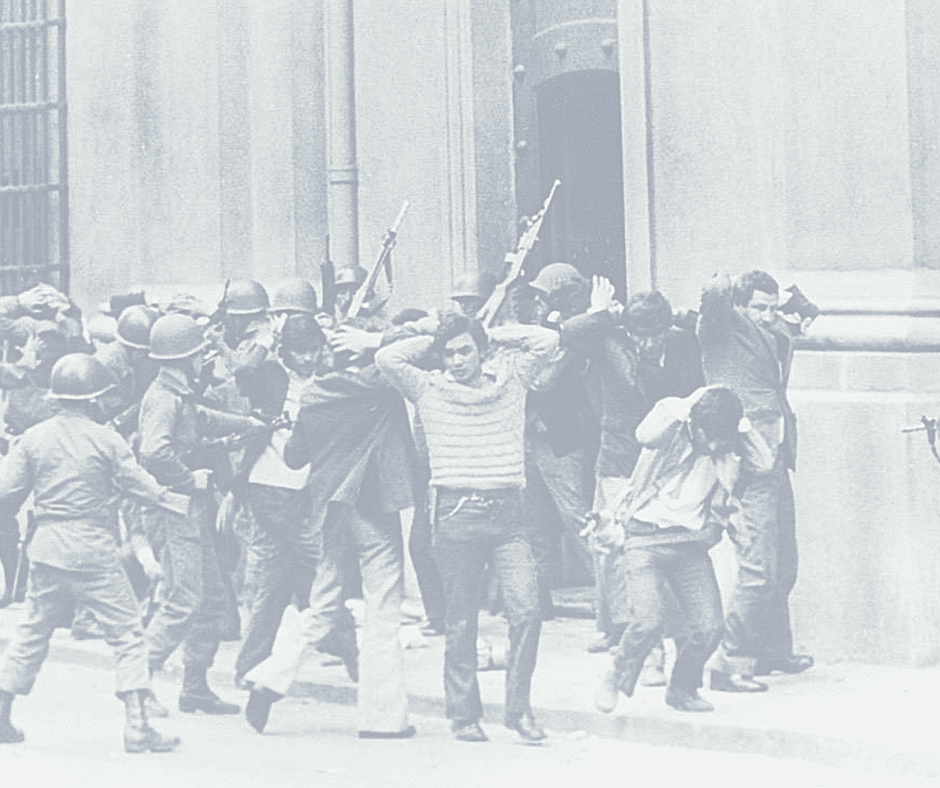Uniformed soldiers and police have blocked off the streets. People are fleeing the city center, and gunfire sounds. The now-infamous coup is underway. While jets come screeching down and bombs drop, rebel soldiers take control of what remains of the presidential palace. The coup has succeeded. The president is dead. A general has taken power and declared martial law. Now soldiers patrol the streets, rounding up hundreds of citizens they see as loyal to the fallen government and to its party. People are forced in masses to the nearest football stadium for an unspecified time of confinement.
This is not Venezuela. This is Chile on September 11, 1973, but the path the US government is now on feels far too similar to what happened then. We’ve been down this road countless times before, and the consequences have always been devastating.
Chile’s violent coup came with the encouragement and endorsement of the Nixon Administration, who opposed the popularly elected and socialist government of Salvador Allende. In the lead-up to the overthrow, the U.S. funded a vicious media campaign meant to sow division and paint the Allende government as incompetent, corrupt, and irresponsible. The U.S. also imposed brutal sanctions, contributing to skyrocket inflation, fallen markets, food shortages, fear, and discontent. After the coup, Washington and London directly supported a fascist dictatorship responsible for tens of thousands of deaths and disappearances, the liberalization of the Chilean economy that brought huge profits to Western companies and their local acolytes, and brutal austerity for the poor, which helped cause the great income gap that plagues Chile to this day.
Today Venezuela finds itself in a similar situation. The nation is deeply polarized, divided along racial and socioeconomic lines, and falling global oil prices have spelled further disaster for a country whose main economic driver is oil. An already challenging dynamic has been exacerbated by US-imposed sanctions, a negative international media campaign, a virulent right-wing insurgency committed to overthrowing the governing party, and the threat of a military intervention from Washington. If Chile’s history has taught us anything, it’s hard to deny the likelihood of CIA involvement in the conservative opposition to Venezuela’s current government.
Recently, members of the Trump Administration including John Bolton, Mike Pompeo, and Mike Pence, along with legislators like Senator Marco Rubio, have implicitly called for the violent overthrow of the Maduro government and recognized, as president of Venezuela, a relatively unknown and unelected politician named Juan Guaidó.
As post-9/11 veterans, this isn’t the first time we’re seeing the parallels between past and present US policies. It’s not lost on us that sanctions preceded US military occupation in Iraq or that oil was a resource in question. Washington, Ottawa and European partners have aligned with local elites, a fragmented opposition, and regional right-wing governments to do everything in their power to oust the current government in favor of one that will serve their interests. And as it has before, we know this policy of US-backed regime change — rather than self-determination — could help lead to the destabilization of an entire country, if not the entire region, with grave consequences to the people of Venezuela for generations to come.
Through our military experience, we’ve witnessed firsthand the impacts of foreign interventions undertaken with little consideration for the civilians being affected. We’ve seen the chaos and destabilization that reverberates. Knowing that the people of Venezuela will continue to organize for their rights and for self-determination — whether or not they support Maduro — we oppose a US intervention that history proves would only serve to worsen, rather than advance, that cause.
We know unequivocally that the interests of the Trump administration do not align with the well-being of the majority of Venezuelans. As they do domestically, Trump’s interests instead lie with a wealthy minority and with international investors and corporations, eager to extract and exploit the region’s natural resources. If the Trump Administration is truly concerned with the plight of the Venezuelan people, we call on them to lift US-imposed sanctions on Venezuela, allow the opportunity for economic recovery without foreign manipulation, and to encourage a diplomatic — not military — solution to the ongoing situation.

